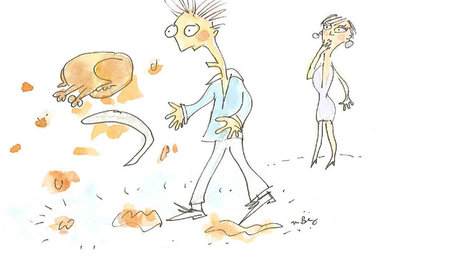When do you stop trusting the vet?
newhomeseeker
15 years ago
Related Stories

CONTRACTOR TIPSBuilding Permits: When a Permit Is Required and When It's Not
In this article, the first in a series exploring permit processes and requirements, learn why and when you might need one
Full Story
MOST POPULARThanksgiving Tales: When the Turkey Tanks
Houzz readers prove adept at snatching victory from the jaws of entertaining defeat
Full Story
LAWN ALTERNATIVESStop Fighting the Patchy Lawn!
Here are 3 situations where a garden may be a better idea than more turfgrass
Full Story
DECORATING GUIDES12 Decorating Scenarios When You Should Do Nothing at All
By embracing the positives of negative space, you can strategically highlight key furnishings, give the eye a rest and create focal points
Full Story
HOUSEKEEPINGWhen You Need Real Housekeeping Help
Which is scarier, Lifetime's 'Devious Maids' show or that area behind the toilet? If the toilet wins, you'll need these tips
Full Story
SELLING YOUR HOUSE15 Questions to Ask When Interviewing a Real Estate Agent
Here’s what you should find out before selecting an agent to sell your home
Full Story
WORKING WITH PROSGo Beyond the Basics When Interviewing Architects
Before you invest all that money and time, make sure you and your architect are well matched beyond the obvious levels
Full Story
SELLING YOUR HOUSEFix It or Not? What to Know When Prepping Your Home for Sale
Find out whether a repair is worth making before you put your house on the market
Full Story
FUN HOUZZWhat You Do When There’s No One Around
Ice cream binges, air guitar concerts, napping in the closet. Houzzers worldwide disclose their quirky secret indulgences
Full Story
REMODELING GUIDES5 Ways to Protect Yourself When Buying a Fixer-Upper
Hidden hazards can derail your dream of scoring a great deal. Before you plunk down any cash, sit down with this
Full Story






annzgw
lfnyc
Related Professionals
Charlotte Furniture & Accessories · Duluth Furniture & Accessories · Rome Furniture & Accessories · Avocado Heights Cabinets & Cabinetry · Maywood Cabinets & Cabinetry · Newcastle Cabinets & Cabinetry · Avondale Flooring Contractors · Campbell Flooring Contractors · Cincinnati Flooring Contractors · Laconia Flooring Contractors · Reading Flooring Contractors · Riverhead Flooring Contractors · Riverside Flooring Contractors · Wheat Ridge Flooring Contractors · Thibodaux Flooring ContractorsnewhomeseekerOriginal Author
trekaren
lfnyc
newhomeseekerOriginal Author
laurief_gw
runsnwalken
Elly_NJ
jenc511
runsnwalken
Meghane
spiritual_gardner
easystitches
lfnyc
chickadeedeedee
runsnwalken
newhomeseekerOriginal Author
cat_mom
newhomeseekerOriginal Author
joepyeweed
newhomeseekerOriginal Author
joepyeweed
newhomeseekerOriginal Author
joepyeweed
Meghane
work_in_progress_08
newhomeseekerOriginal Author
joepyeweed
runsnwalken
newhomeseekerOriginal Author
newhomeseekerOriginal Author
home_nw